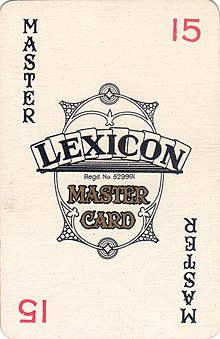Lexicon (card game)
The topic of this article may not meet Wikipedia's general notability guideline. (February 2023) |
 Master card from 1933 edition | |
| Other names | Lex, Lexicon with Tiles, Lexikon, Crossword Lexicon, Script |
|---|---|
| Designers | David Whitelaw |
| Publishers | Waddingtons |
| Publication | 1932 |
| Players | 2–4; more with an additional deck |
| Setup time | 2 minutes |
| Skills | Vocabulary, spelling |
Lexicon is a word game for 2 to 4 players[1] published as a shedding card game.
Publication history
Lexicon was created by David Whitelaw in 1932[2] and originally published by Waddingtons. After a poor launch for an initial small edition as a market test, Waddingtons upgraded the packaging and increased the price, and by late 1932 were selling thousands of units per day in stationery shops.[3] A section in the rulebook was titled "How to arrange a Lexicon drive" for the organisation and execution of a party or tournament based on Lexicon.[1]
By 1934, the game was being sold internationally. In March 1934, proceeds from a game in Australia were donated towards children's health care.[4]: 20 In the United States, it was distributed by Parker Brothers as Crossword Lexicon.[5]: 1 In 1938, George Parker stated that of all games sold by the company, the demand for Lexicon was only exceeded by that of regular playing cards.[5]: 1
Early rulebooks distributed with the game contained instructions for 23 games that could be played by 2 to 4 players with the deck cards.[1] [6]: 25 Certain copies came with a 1936 competition slip wherein £1,000 was offered in cash prizes. Several subsequent versions have been released.
In 1983, Waddingtons organised the Lexicon Golden Jubilee Weekend to celebrate the 50th anniversary of the game.[7]: 19 It was hosted at the Victoria Hotel in Nottingham with various Lexicon-themed games, including "team Lexicon, Lexicon criss-cross, Lexicon clock patience, and individual games", as well as a dinner with alphabet soup, a lecture by the author of A History of Waddingtons, and a prize presentation event.[7]: 19
Waddingtons was purchased by Hasbro in 1994, which later sold Lexicon to Winning Moves.[3]
Gameplay
Each player is dealt ten cards from a pool of 52,[2] each depicting a letter and a point value.[6]: 25 Two packs of cards are used for more than 5 players.[2] The letter distribution was originally four each of the vowels 'A', 'E', and 'I', three each of the vowels 'O' and 'U' and the consonants 'H', 'L', 'R', 'S', 'T', and 'W', and one each of the other letters and the Master card.[1]
On their turn, a player may lay down a complete word with their letters, extend a word already played, or discard one of their cards and draw one from the top of the draw or discard piles.[6]: 25 The player may also choose to exchange one or more cards with those forming a word in play, so long as the exchange results in a complete word.[2]
The object is for a player to eliminate all cards from their hand.[8]: 8 When a player has no cards left in their hand, the round ends and the other players each tally the point value of the cards they hold.[6]: 25 A player may challenge a word as being non-existent or mis-spelt. A successful challenge reduces the challenger's accumulated points by 10, and an unsuccessful one increases it by 10.[2] When a player has accumulated 100 penalty points over any number of rounds, they are eliminated from the game, and the last player remaining is the winner.[6]: 25
Reception
An entry in a 1934 article in The Sydney Mail stated that the cards "are packed in amusing little boxes looking like pocket dictionaries".[4]: 20 In 1938, the game was promoted by Jane Froman on her radio programme Radio Row.[9]: 3
In a 1973 review, Richard Sharp described it as "durable game" owing to its simplicity, as players can learn its rules quickly and games are generally short.[6]: 25
In its catalogue description, the Victoria and Albert Museum state that Lexicon is "the best known of the more sophisticated spelling card games" published during the 1920s and 1930s.[2]
Reviews
References
- ^ a b c d "Lexicon". Elliott Avedon Museum and Archive of Games. University of Waterloo Faculty of Health. 5 June 1998. Retrieved 24 February 2023.
- ^ a b c d e f "Lexicon". Victoria and Albert Museum. 29 August 2015. Retrieved 22 February 2023.
- ^ a b Wintle, Simon (29 August 2015). "Lexicon". The World of Playing Cards. Retrieved 22 February 2023.
- ^ a b "Social news and notes". The Sydney Mail. 14 March 1934. Retrieved 23 February 2023.
- ^ a b Blalock, Dick (19 March 1938). "Inventor of famous games began success career as schoolboy". Evening Independent. Retrieved 23 February 2023.
- ^ a b c d e f Sharp, Richard (March 1973). "Games View". Games & Puzzles. No. 11. Retrieved 22 February 2023.
- ^ a b "Weekend fun for the word game fans". Evening Times. 29 July 1983. Retrieved 24 February 2023.
- ^ Ross, Eleanor (23 December 1938). "Household hints". Washington Reporter. Retrieved 23 February 2023.
- ^ "Right out of the air". Sheffield Observer. 10 February 1938. Retrieved 23 February 2023.
- ^ https://archive.org/details/sim_games-and-puzzles_1974-12_31/page/14/mode/2up
Further reading
- Watson, Victor (2008). The Waddingtons Story. Northern Heritage Publications. ISBN 9781906600365.
